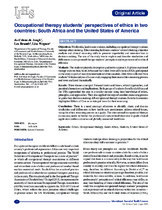| dc.contributor.author | de Jongh, Jo-Celene | |
| dc.contributor.author | Brandt, Lea | |
| dc.contributor.author | Wegner, Lisa | |
| dc.date.accessioned | 2019-08-19T08:48:27Z | |
| dc.date.available | 2019-08-19T08:48:27Z | |
| dc.date.issued | 2019 | |
| dc.identifier.citation | de Jongh, J.-C., Brandt, L., & Wegner, L. (2019). Occupational therapy students’ perspectives of ethics in two countries: South Africa and the United States of America. International Journal of Health Sciences, 13(4). Retrieved from https://ijhs.org.sa/index.php/journal/article/view/3767 | en_US |
| dc.identifier.issn | 1658-7774 | |
| dc.identifier.uri | https://ijhs.org.sa/index.php/journal/article/view/3767 | |
| dc.identifier.uri | http://hdl.handle.net/10566/4858 | |
| dc.description.abstract | Objectives: Worldwide, health-care students, including occupational therapy students undergo ethics training. Ethics training facilitates students’ critical thinking, objective analysis and clinical reasoning skills to promote impartiality and minimize bias in decision-making. The aim of the study was to explore and describe similarities and differences in occupational therapy students’ perceptions and experiences of an ethical dilemma.
Methods: The study employed a descriptive qualitative approach. Eighty occupational therapy students from South Africa and the United States of America (USA) participated in the study as part of an online international ethics module. Data were collected from students’ written analyses of a case study engaging them in an ethics reasoning process and were analyzed thematically.
Results: Three themes emerged: Personal views and biases, ethical approaches, and practical alternatives and implications. Both groups of students from South Africa and the USA approached the case in a similar manner using their knowledge of ethics, principles, and approaches. They also applied the steps of an ethics reasoning process to guide their decision-making. All occupational therapy students from both countries highlighted Ethics of Care as an integral basis for their reasoning.
Conclusion: There is a need amongst educators to identify, share, and discuss similarities and differences in how health-care practitioners address ethical issues, using the ethics reasoning process as a guide. The international occupational therapy community needs to further the profession’s meta-ethical discourse to guide clinical application within a diverse and globally connected workforce. | en_US |
| dc.language.iso | en | en_US |
| dc.publisher | International Journal of Health Sciences | en_US |
| dc.subject | Ethics | en_US |
| dc.subject | Occupational therapy | en_US |
| dc.subject | South Africa | en_US |
| dc.subject | United States of America | en_US |
| dc.subject | Students | en_US |
| dc.title | Occupational therapy students’ perspectives of ethics in two countries: South Africa and the United States of America | en_US |
| dc.type | Article | en_US |

